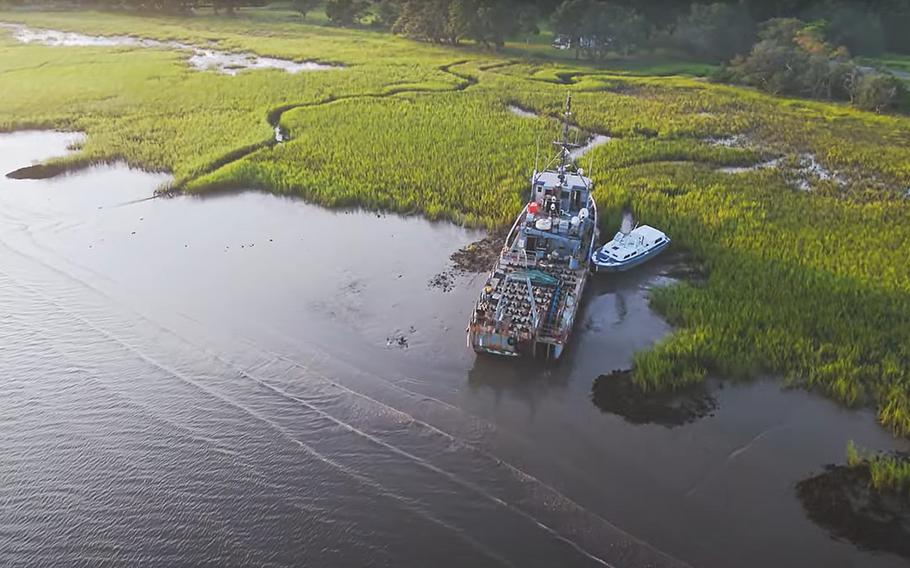
A video screen grab shows two vessels, one of which is a 120-foot-long former Navy mine sweeper, parked on Bohicket Creek, S.C. (YouTube)
(Tribune News Service) — It’s not particularly unusual to find abandoned boats along South Carolina’s coast, but then there’s the one on Bohicket Creek near Seabrook Island — a 120-foot long, welded steel former Navy mine sweeper stuck in seagrass and pluff mud.
Beside it is a 30-foot cabin cruiser, both owned by the same man, authorities say, who has been unreachable for more than the year the boats have been in the creek, not too far from the North Edisto River.
So far, the boats are not leaching chemicals or fuel into the waterway, according to a test done by an agency associated with the National Oceanographic and Atmospheric Administration. The March 2023 tests done at the request of the South Carolina Department of Natural Resources said no contamination was found.
“It could be an ecological disaster. It wouldn’t take much,” said Andrew Wunderley, executive director of Charleston Waterkeeper, a nonprofit founded in 2009 to protect Charleston’s waterways.
The Navy ship was sold by the General Services Administration March 12, 2021 for $81,600, Mary Simms, GSA’s regional public affairs officer said. She said the agency does not reveal buyer’s names.
The Coast Guard has been aware of the vessel being in South Carolina waters since 2021. Lt. Michael Allen said, and it is checked periodically.
He said if contaminants are found the Coast Guard would take emergency remediation.
“The owner has made minimal effort to comply with orders from the Coast Guard and has received fines,” Allen said.
The owner purchased the Navy vessel, then known as 120TR841, from the General Services Administration at a federal auction in March 2021, Allen said.
It was built by Wisconsin-based Marinette Marine in 1986.
Now called HAZAR, the vessel was not allowed by the Coast Guard to be operated because it did not have federal documentation, which is required because the vessel is too large to be issued a Certificate of Number by the state, Allen said.
The owner still has not obtained federal documentation, he said.
The challenge in getting the boats out of the creek is that no federal or state entity has sole legal authority to fully resolve this situation by itself, Allen said.
The Coast Guard has been working closely with representatives from Natural Resources and the South Carolina Department of Environmental Services to figure out what to do.
Laura Renwick of Environmental Services said the Bureau of Coastal Management began tracking the vessel in December 2022. Mail sent to the owner has been returned.
Allen said derelict and abandoned vessels are an issue in nearly all waters of the United States and fall primarily to local governments to handle them. There are so many no one interviewed was willing to hazard a guess.
Renwick said the state launched a pilot program, called Vessel Turn-in Program, this past spring. They received 65 applications from boat owners and is gathering information before holding a turn-in event in late summer or early fall.
“We’ve also contracted with two third-party companies and are working to finalize the details for the transport, processing, and disposal of the vessels,” she said.
Wunderley said most abandoned boats in the Charleston area are sailboats and typically end up ditched along the coast because the owner has run out of money to maintain them or they are at the end of their life span.
Several Charleston area cities, such as Folly Beach and Mount Pleasant, have active programs to tag abandoned boats and get them out of the water.
The challenge is in outlying areas of the watershed where boats are better hidden.
But there’s no hiding a 120-foot Navy ship. It can be seen from Cherry Point Public Boat Landing on Wadmalaw Island and from Seabrook Island.
Allen said the situation can be remedied in a number of ways, including getting the owner to remove it. He could obtain the Certificate of Documentation.
“The Coast Guard has made it clear to the owner on multiple occasions that we would work with them to authorize limited vessel movement, with conditions, to ensure safety, security and environmental stewardship in the Port,” Allen said.
The Coast Guard could remove the environmental contamination, but it must be shown there is an immediate threat of pollution. The remediation would be done on site.
“If it is necessary to move the vessel to safely mitigate a pollution threat, this movement would have to be coordinated with the state,” Allen said. “In short, where do we move the vessel to? This would have to be known and coordinated with the state, a private property owner, or involved shipyard.”
Wunderly said a scrapyard is the best place for the vessel.
“There should be some scrap value to it,” he said.
©2024 The State.
Visit thestate.com
Distributed by Tribune Content Agency, LLC.